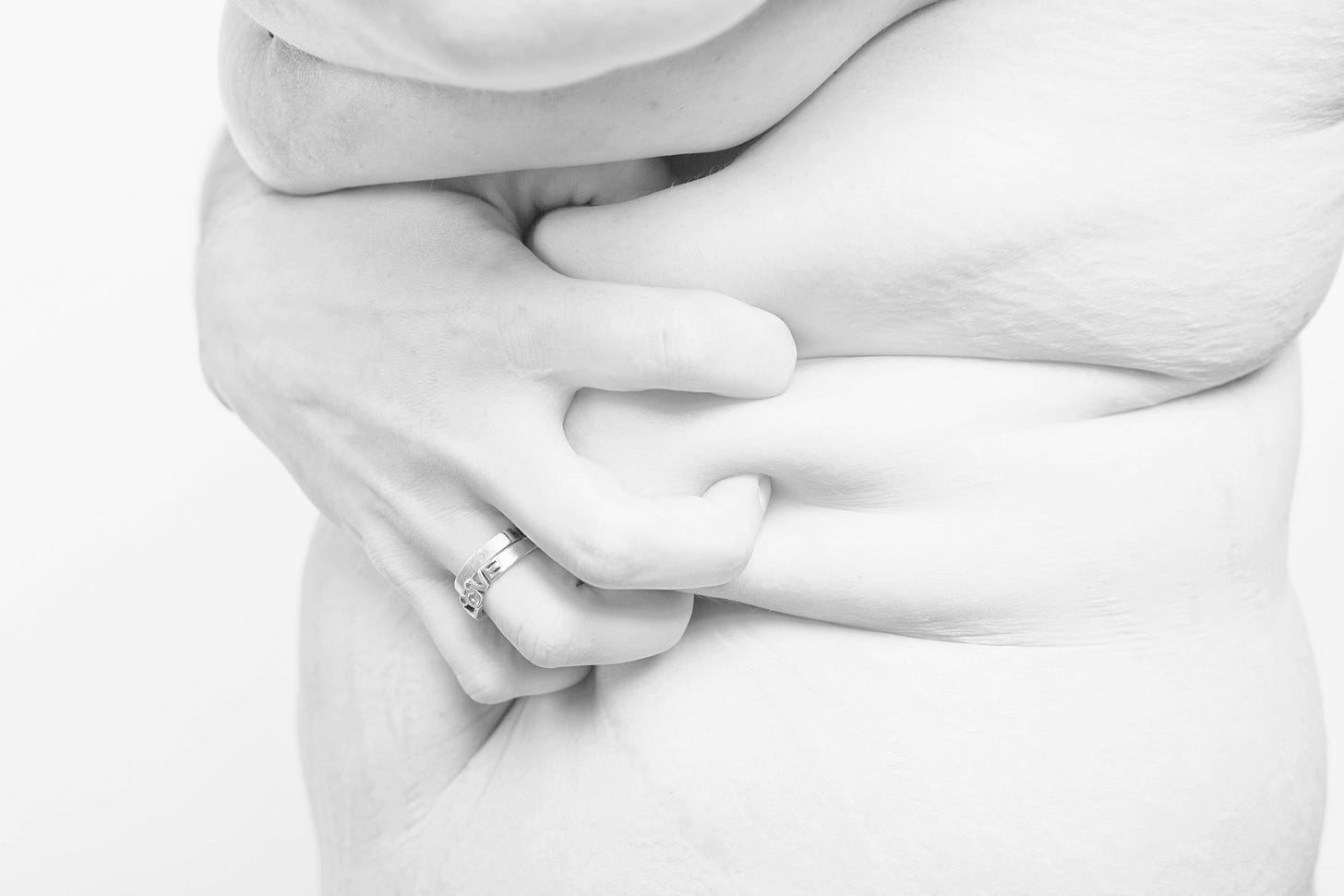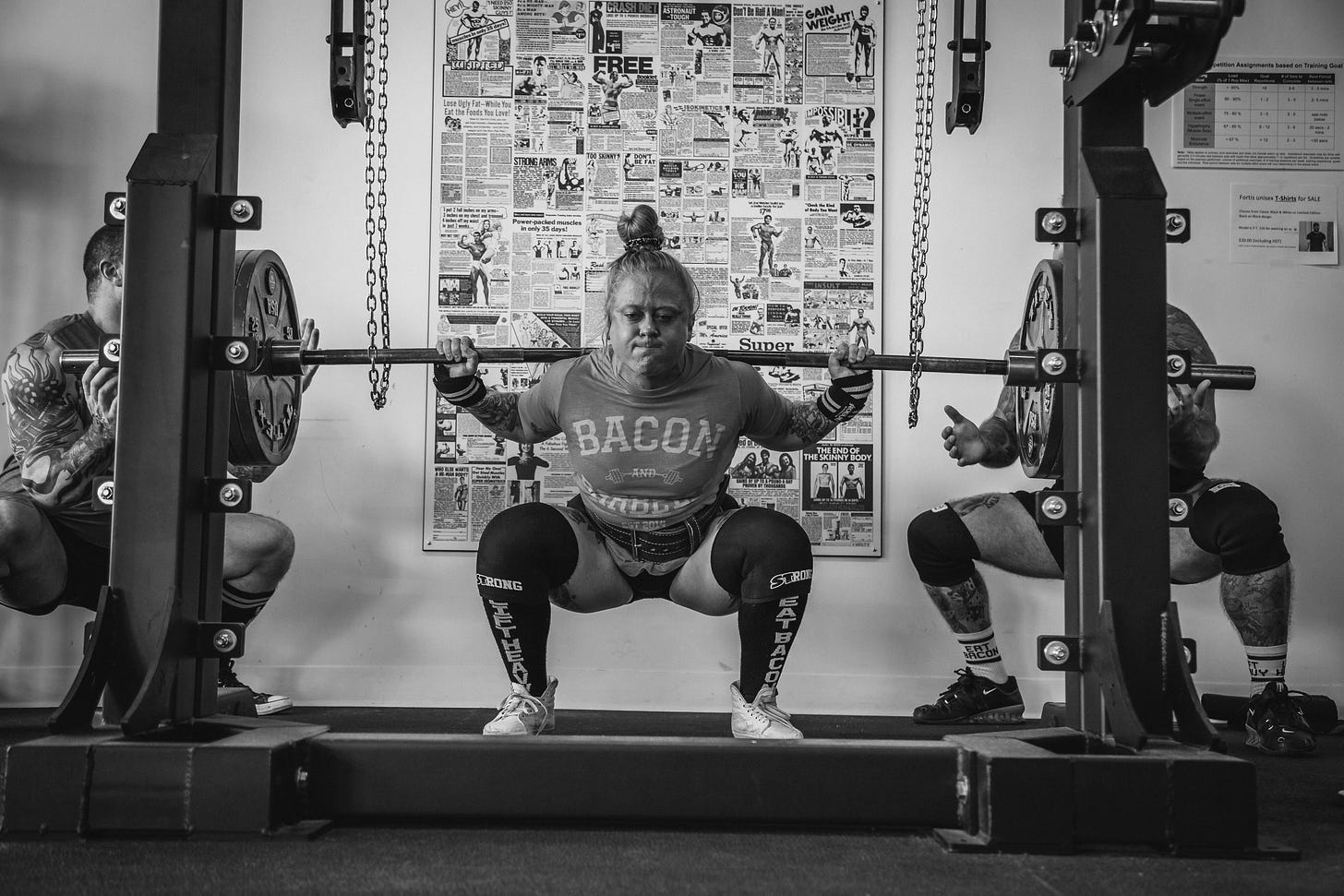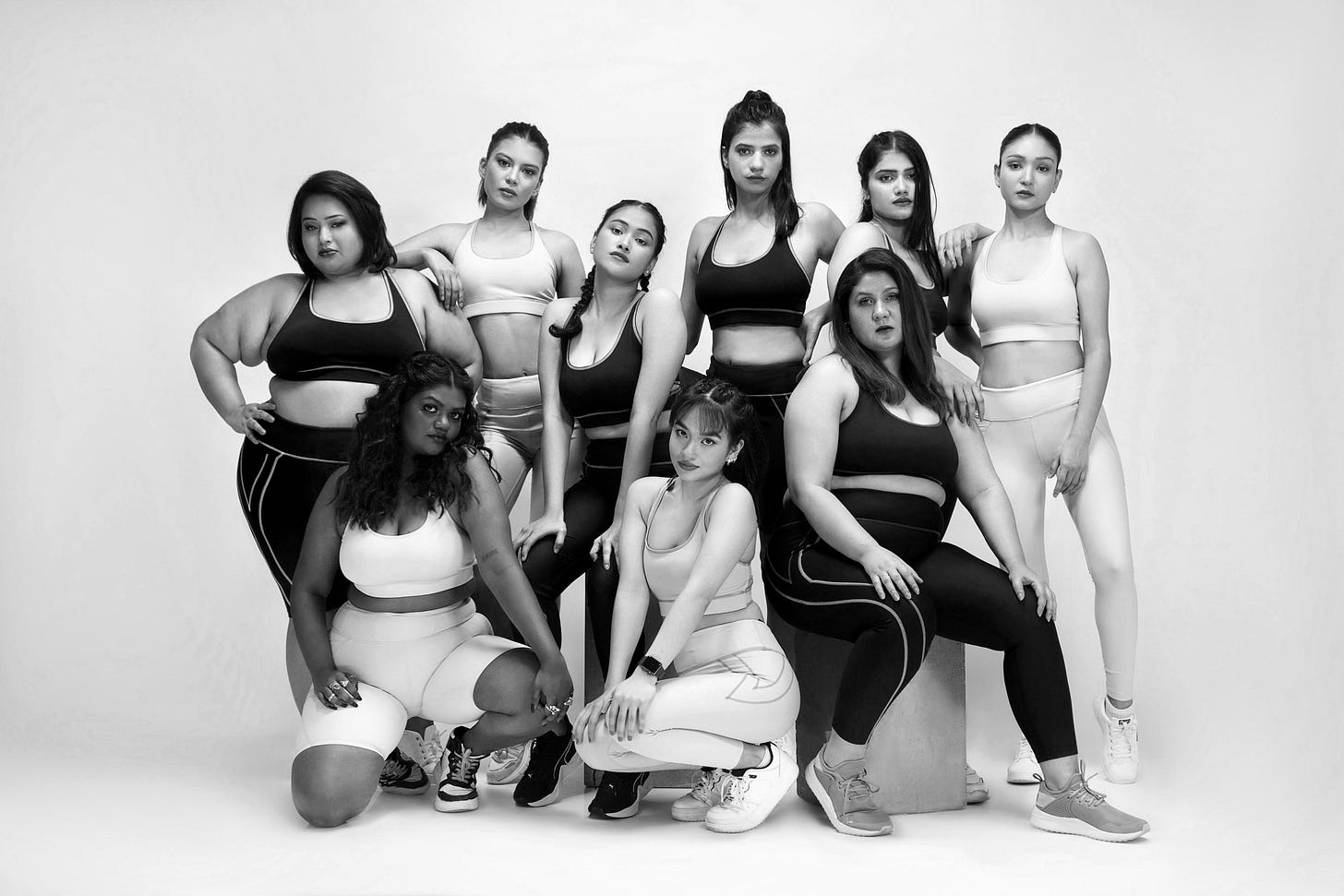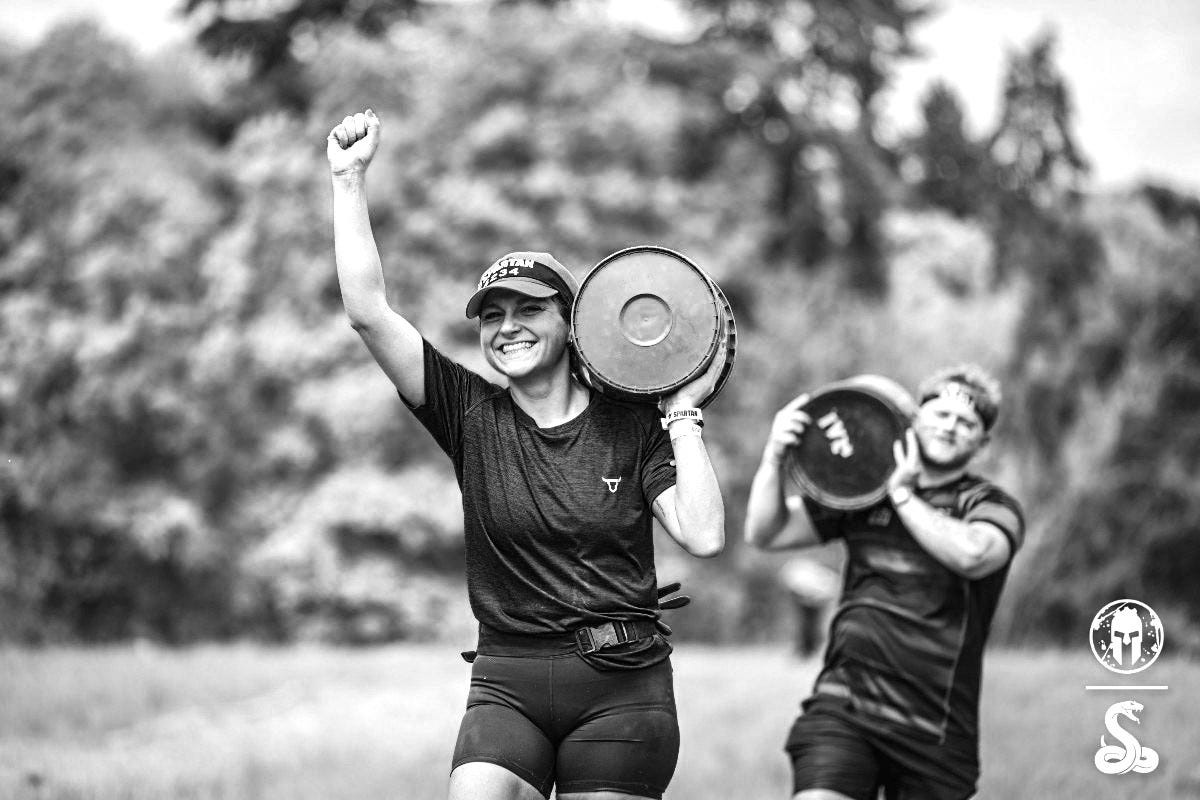Fat Girl, Fit Woman: The Lies We're Told, The Lies We Live
Unpacking the lies about fatness, fitness, and female worth

Every woman remembers her first time. It’s hard to forget, really. It burns itself deep into your memory, weaving itself into your very tissue, changing the way you feel about yourself. When you look in the mirror, you no longer see just a girl. You see a body that has been irrevocably changed. Imprinted by their gaze. Touched by judgment. By shame. By someone who sees your body- not as strong, not as yours- but as fat.
Do you remember your first time? The moment you learned your body wasn’t good enough? Not slim enough. Not strong enough. Not beautiful enough. Not enough but definitely too much. That quiet but brutal shift when your relationship with your body went from joy to fear. From innocence to self-surveillance. From freedom to shame.
To this day, I see it in my mind like a reel. I’m younger Milena, sitting at my parents’ dining table, mid-conversation with a family member (who will remain unnamed). We’re talking about Serena Williams, fresh off another Grand Slam win. Somehow, someone calls her “an impressive, but big girl.” I paused. “She’s not big,” I said, “and even if she is, being big doesn’t mean you can’t be fit.” Another pause. “She has a pretty high BMI,” they replied. “She doesn’t need to be that big.”
I remember being stunned into silence. Serena freaking Williams. Arguably the greatest female athlete of our time. Stronger than most, faster than many, more disciplined than nearly everyone. If she-who trains in the heat, the pressure, the spotlight- was seen as too big, too much, too unhealthy… what chance did I have?
That one throwaway comment was like a knife. A casual judgment that didn’t even register to them. But for me? It changed everything.
It crystalized how I, as a girl was seen, how I as a woman, would always be seen. Not as capable. Not as worthy. As fat. As wrong. If Serena isn’t enough, then how could I be?
When I first started losing weight, I told my PT I didn’t want to chase a number on a scale. “So how do so we set goals?” I asked him. “Do I show you pictures of butts I like?” He laughed kindly. “You’re not a collection of images or parts. You are a person with your own body type. Let’s figure out how you enjoy using it.” That night, he sent me a list of fitness challenges-and one in particular stood out: a Spartan 10km Beast Race.
Mud. Mayhem. Madness. It wasn’t about looking good, it was about surviving something raw and real. A rebellion against comfort. A way to reclaim pain as purpose. I didn’t just want to get fit- I wanted to feel fierce.
I wanted to be someone who could crawl through mud, scale walls, and leap over fire. To do something hard. Something wild. Something unapologetically mine.
I trained for six months. Dragged my partner along (grumbling the whole time), and with my PT (now a dear friend) and a small crew of rag-tag strangers who became comrades, I crossed the finish line of what once felt unimaginable. That day, I didn’t feel fat. I didn’t feel judged. I felt strong. And free.
What we lose when we shrink
No one tells you that when you lose the weight you never lose the internalized shame. It lingers in the crevices of memory and perception. No one tells you about the grief you experience in losing yourself with every pound on the scale. The different kind of shame you have in killing the person who kept you safe. Who brought you joy.
I didn't just lose weight. I lost myself as well.
I remember when I first really realized my body had changed. I had just been enjoying feeling less pain from my slipped discs in my back and getting strong through weight lifting. But it was my partner who clocked the difference. He hugged me and exclaimed, "where's my wife gone?! It's like being in bed with a stranger." I laughed it off responding, "most men would be ecstatic that their wife got hotter after marriage." My always amicable husband looked at me seriously, "I always thought you were hot." I secretly cried about that later. The kind of deep grief that only women know. I hated her- my body that is. The one he always loved.
That moment gutted me. The warring emotions it stirred in me. Not because of what he said, but because of what I had always believed.
I grieved for the version of me I had spent years hating- the body he had always loved.
The body who had carried me, served me.
The body I had failed to see. Failed to loved. Failed to appreciate.
I had always been enough. Hadn’t I?
Fit doesn’t have to look Like that

It’s hard to find your place in a “fitness” culture that often feels more like a performance than a celebration of health. When the loudest voices push punishment over joy, aesthetics over ability, and hustle over healing — where do the rest of us fit in? It's strange to find yourself discovering your fitness as an adult.
Fitness has such negative connotations. It's synonymous with unrealistic body ideals, diet culture, toxic gym culture, or performative wellness. To be frank it makes me think of athletes, jocks and wankers. The types of people, and a way of life that is as far from my own sense of self that I could imagine. Yet over the past years, I have been trying to carve out a space for myself focused on movement, and physical well-being. I want to find a way to build my strength, confidence, and connection with, and in my body.
I want to find a way to use my body. To love my body as she is, was, and will be.
That’s exactly why I started writing HerPace. Maybe there are more women like me, losing and finding themselves with every step. It’s not about shrinking ourselves. It’s about taking up space, at our own pace.
Fit, fat, and everything in between

The world around us constantly reminds us of who it prefers. The thinner me. The “acceptable” me. My BMI still labels me overweight, even though I train 5–6 days a week. I can now always find a size in stores. I never worry about fitting into seats. I am by all accounts a conventional and healthy size. Yet, I still dissect my body. I have to work hard to focus on what its capable of, not the number on the scale.
But I can't help but wonder where the fit girl begins and fat girl ends? Does it even matter? Why do both still feel not enough? Even now, I catch myself in the mirror trying to really see my body- see past my body.
I wrestle constantly with the question: what does it mean to be fat, fit or both? Society tells us these are incompatible, but lived experience says otherwise. The challenge isn’t just about how others see you—it’s also about how you see yourself. And unlearning that dissonance is a lifelong task.
There are undeniable privileges to thinness. Being in a smaller body means moving through the world with less judgment, more acceptance, less pain and a strange sense of relief. But it’s a currency that costs more than it’s worth when your worth has always been tied to your size.
So I keep moving. Keep rebuilding. Keep trying to come to terms with the many versions of myself that have existed- and still exist.
Fat girl. Fit woman. Work in progress.
If you enjoyed this piece please feel free to subscribe for more articles and content from HerPace.






Thank you for sharing your journey, it was a beautiful read. My body perception changed when I had a baby. I carried huge and pushed him out posterior for 5 hours. I was like an Amazonian, I never knew I had that kind of strength in me. I have very real mental images of lying with my pelvis in the sky, feet above me on a bar at the end of the bed, and a hospital sheet wrapped around the bar and my arms so I could use every muscle in my body to get him out. Roaring bloody murder the entire time.
My body is different now, but every time I look at it and those negative thoughts creep in I think about just how strong it is and I'm proud.
This piece made me tear up bc you tapped into something very raw that I have struggled since I was a teenager. Even when I was in the Army and the fittest I ever was, I still felt fat. I hate that I'm now in my early 50s and still mostly hating the body who has carried me, mostly without complaint, through an amazing life. How do I stop or reprogram that awful voice in my head?